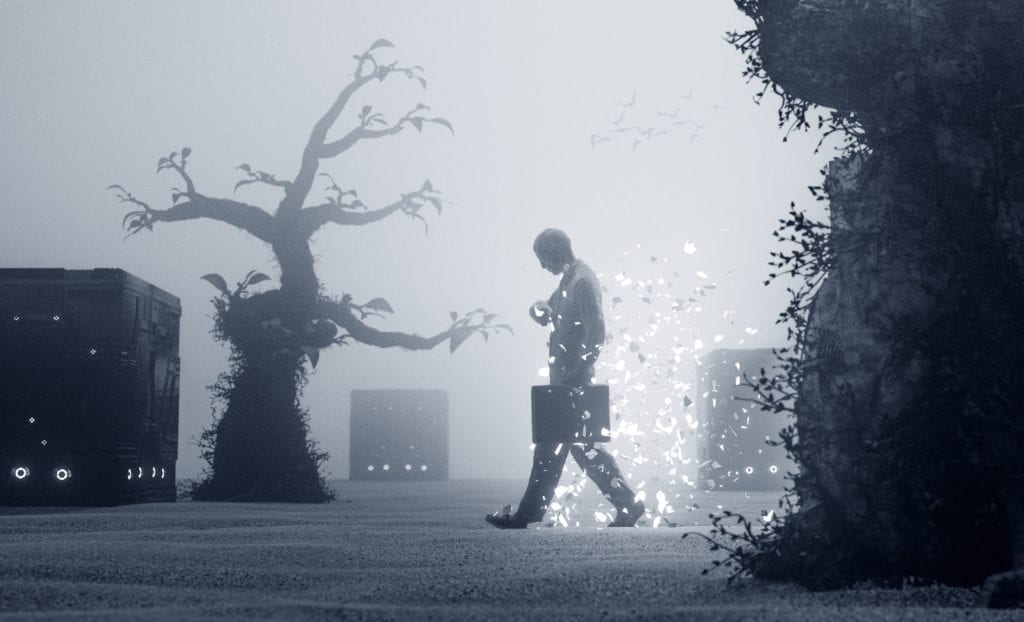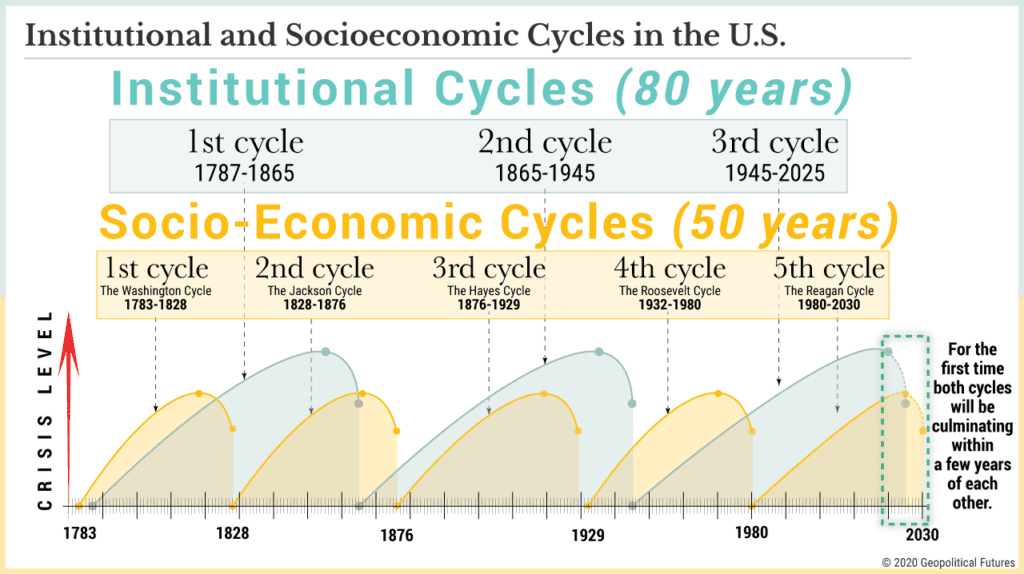Four perspectives on navigating 2025 as a stranger in a strange land, from George Friedman, G. Michael Hopf, Alasdair Gray, and Robert Louis Stevenson.
Entering 2025 as a Stranger in a Strange Land
“When things become unhinged, wisdom and experience are a handicap in discerning the shape of things to come.”
Eric Hoffer in “Reflections on the Human Condition” (1973)
Covid-19 meant 2020 was a very different year. We had worse-case templates for what to expect from a number of dystopian plague movies–all thankfully incorrect. 2025 looks to be unrecognizably different. A hero’s journey without signposts or sages to provide guidance.
YOU ARE STANDING AT THE END OF A ROAD BEFORE A SMALL BRICK BUILDING. AROUND YOU IS A FOREST. A SMALL STREAM FLOWS OUT OF THE BUILDING AND DOWN A GULLY.
 This is the beginning to the Colossal Cave Adventure, the first text based adventure game. I played it in the Winter Quarter of my freshman year in 1977. I had learned Algol-60 using punch cards in the Fall Quarter, and then shifted to a DECSystem-20 time sharing system the next quarter. When I got to Cisco in 1990 I was surprised to see two DEC 20 systems–called Heap and Mathom–still in active use for hardware design. Cisco was an adventure, but one I was prepared for.
This is the beginning to the Colossal Cave Adventure, the first text based adventure game. I played it in the Winter Quarter of my freshman year in 1977. I had learned Algol-60 using punch cards in the Fall Quarter, and then shifted to a DECSystem-20 time sharing system the next quarter. When I got to Cisco in 1990 I was surprised to see two DEC 20 systems–called Heap and Mathom–still in active use for hardware design. Cisco was an adventure, but one I was prepared for.
“You are a stranger in a strange land, poor man. Make your mind up to reject what this city dislikes, and reverence what she loves.”
Sophocles in Oedipus at Colonus Line 189-193I have been a stranger in a strange land.
Exodus 2:22
I find the last three months as disorienting as the last three months of 2001 when the Twin Towers fell and the dotcom crash was well underway. Much of what I knew about the world and the models I had relied on were out of date. I am not at the “everything you know is wrong stage” but it feels like were are in the midst of inflections in several trends in technology, media, and governance models.
Four Perspectives on 2025 I am Using For Guidance
I have four perspectives I have clutched for guidance. The first is from George Friedman’s “The Storm Before the Calm,” which posits a significant inflection point in how the US Government functions, similar to the changes wrought by the New Deal. It was written in 2020 and seemed much more speculative in 2022 when I read it than it does today.
The second is a line from a short conversation in G. Michael Hopf‘s “Those Who Remain‘ where a grandfather talks to his grandson to explain the post-Apocalyptic devastation they find themselves in: ““Hard times create strong men, strong men create easy times, easy times create weak men, and weak men create hard times.” My father was four when the stock market crashed in 1929. He served in the Navy on a submarine in WW2 and viewed the war years as a cultural watershed. Once I understood how much our parents, grandparents, and older ancestors sacrificed so that we could live in freedom and security, it made it clear that it was now our turn to pay it forward.
My third perspective comes from Alasdair Gray
“Work as if you live in the early days of a better nation.”
Alasdair Gray
One rule of thumb is to assume you are at the midpoint of the lifetime of a trend or movement. There is no reason the US cannot survive another 250 years, although there are plenty of reasons to be concerned. The trends at work in computing mean the nature of work is likely to change significantly in the next 40 years. But if I look back to when I entered the workforce in 1980, much has changed already. The telephone enabled significant innovations in how business was practiced from my grandfather’s perspective. The evolution of sensor networks (Internet of Things) may tempt some to build surveillance states as chilling as Orwell’s “Nineteen Eighty-Four” but can also enable more care and prosperity if embraced humanely. And biotechnology may lure us into something like Huxley’s “Brave New World” but could also bring about substantial improvements in health and longevity.
I take my fourth perspective on how to navigate the strange land of 2025 from a prayer by Robert Louis Stevenson the he called “Success:”
“Give us grace and strength to forbear and to persevere. Give us courage and gaiety, and the quiet mind. Spare to us our friends, soften to us our enemies. Bless us, if it may be, in all our innocent endeavors. If it may not, give us the strength to encounter that which is to come, that we may be brave in peril, constant in tribulation, temperate in wrath, and in all changes of fortune, and down to the gates of death, loyal and loving to one another.”
Robert Louis Stevenson (1850-1894) in “Prayers Written At Vailima“
PostScript Feb-1-2025
After I posted this on LinkedIn, Keith Redfield left a comment, “Well done! l believe we live in the most consequential time in human history.” I replied, “I am reminded of the Chinese curse ‘May you live in consequential times.'” I was riffing on “may you live in interesting times,” a quote I curated in October 2020.
“For the fortunate amongst us, the fourth danger is comfort; the temptation to follow the easy and familiar path of personal ambition and financial success so grandly spread before those who have the privilege of an education. But that is not the road history has marked out for us. There is a Chinese curse which says “May he live in interesting times.” Like it or not, we live in interesting times. They are times of danger and uncertainty; but they are also the most creative of any time in the history of mankind. And everyone here will ultimately be judged –will ultimately judge himself–on the effort he has contributed to building a new world society and the extent to which his ideals and goals have shaped that effort.”
Robert Kennedy in a speech in Cape Town, June 6, 1966
I noted at the time, “It’s not a real Chinese curse but Kennedy’s phrasing is memorable. 2020 has exceeded my OSHA limit for exposure to living in interesting times. Tolkien, who knew something about interesting times from his days in WWI trench, suggests a stoical approach in preference to lamentation that things are not easier.”
‘I wish it need not have happened in my time,’ said Frodo.
‘So do I,’ said Gandalf, ‘and so do all who live to see such times. But that is not for them to decide. All we have to decide is what to do with the time that is given us. And already, Frodo, our time is beginning to look black. The Enemy is fast becoming very strong. His plans are far from ripe, I think, but they are ripening. We shall be hard put to it. We should be very hard put to it, even if it were not for this dreadful chance.
J. R. R. Tolkien in “The Fellowship of the Ring” [book]
I curated the Tolkien quote again in December of 2023, noting “I wish it need not have happened in my time” to 2022–but not 2023. I worry that somewhere in 2024 to 2026 we face a larger set of challenges and an inflection point in our zeitgeist. This was George Friedman’s thesis in ‘The Storm Before the Calm’ and it seem more likely to me now than when I first read it in November 2022.”
Postscript Feb-14-2025: Your mileage may vary, but now that it’s mid-February 2025 I would offer a sixth perspective, this one from Harry Truman: “There’s is nothing new in the world except the history you do not know.”
Related Blog Posts
- Traveling Hopefully (From Jan-1-2011)
- Good Fortune
- Do You Ever Get the Feeling That Everything You Know is Wrong?
- The Search for Validation is Baggage and You Need to Travel Light
- Eliza Calvert: Piecing a Quilt is Like Living a Life
- Marshall McLuhan: How to See the Future
Photo Credit: “Businessman walking in surreal desert” licensed from iStockPhoto ID 1062765058
I thought this captured feeling like a stranger as you move into unfamiliar landscapes.
Diagram Credit: Institutional and Socioeconomic Cycles in the United States (c) 2020 Geopolitical Futures, used with attribution.
This post was republished at https://www.linkedin.com/pulse/entering-2025-stranger-strange-land-sean-murphy-fskcc/

